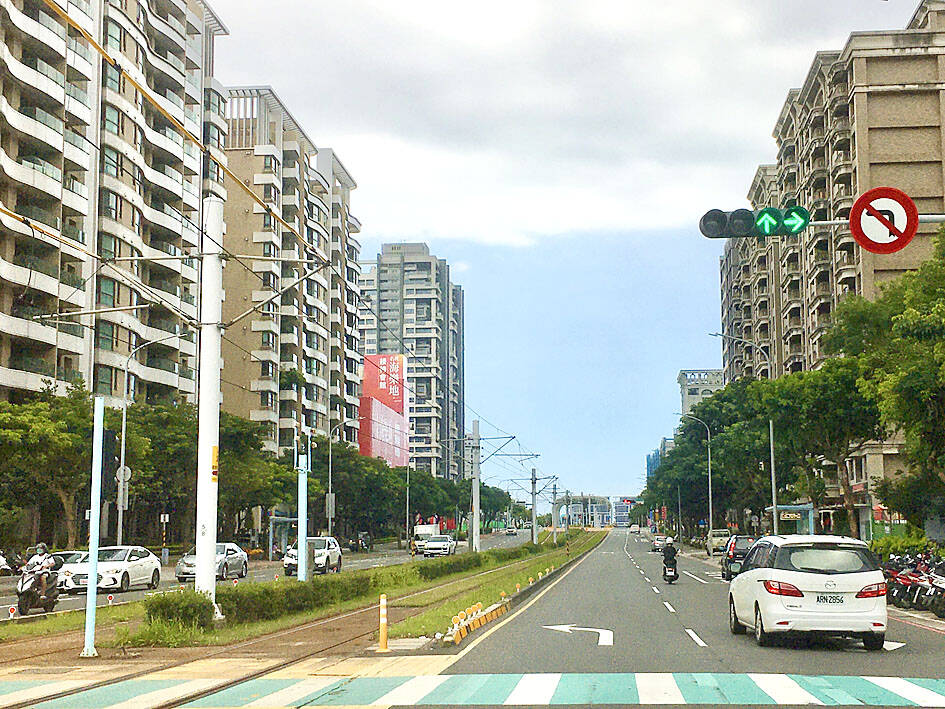The nation’s rent index last month climbed to a record 106.77, suggesting a pickup of 2.07 percent on average from a year earlier, Sinyi Realty Inc (信義房屋) said yesterday, citing government data.
The increase was fastest in southern Taiwan, with a 2.36 percent advance, followed by 2.1 percent in northern Taiwan, 1.92 percent in eastern Taiwan and 1.84 percent in central Taiwan, Sinyi said.
Tenants might feel the pinch more acutely than the readings have suggested, as the uptick added to the overall financial burden caused by COVID-19 restrictions weighing on economic activity and household incomes, Sinyi research manager Tseng Ching-der (曾敬德) said.

Photo: Hsu Yi-ping, Taipei Times
Rising property prices and wages in the past few years have helped drive up rent rates, while a stable housing supply also lent support, Tseng said.
The government has been offering rent subsidies to disadvantaged tenants to ease financial pressure, he said.
Although rents have continued to increase, they remain moderate compared with mortgage payments, Tseng said.
The phenomenon could cause people to prefer renting over buying, especially if the central bank raises interest rates on mortgages above 2 percent, he said.
An interest rate hike in December could lift interest rates to 2 percent, Tseng said, adding that landlords would most likely pass the extra financial burden on to tenants.

COMPETITION: AMD, Intel and Qualcomm are unveiling new laptop and desktop parts in Las Vegas, arguing their technologies provide the best performance for AI workloads Advanced Micro Devices Inc (AMD), the second-biggest maker of computer processors, said its chips are to be used by Dell Technologies Inc for the first time in PCs sold to businesses. The chipmaker unveiled new processors it says would make AMD-based PCs the best at running artificial intelligence (AI) software. Dell has decided to use the chips in some of its computers aimed at business customers, AMD executives said at CES in Las Vegas on Monday. Dell’s embrace of AMD for corporate PCs — it already uses the chipmaker for consumer devices — is another blow for Intel Corp as the company

ADVANCED: Previously, Taiwanese chip companies were restricted from building overseas fabs with technology less than two generations behind domestic factories Taiwan Semiconductor Manufacturing Co (TSMC, 台積電), a major chip supplier to Nvidia Corp, would no longer be restricted from investing in next-generation 2-nanometer chip production in the US, the Ministry of Economic Affairs said yesterday. However, the ministry added that the world’s biggest contract chipmaker would not be making any reckless decisions, given the weight of its up to US$30 billion investment. To safeguard Taiwan’s chip technology advantages, the government has barred local chipmakers from making chips using more advanced technologies at their overseas factories, in China particularly. Chipmakers were previously only allowed to produce chips using less advanced technologies, specifically

MediaTek Inc (聯發科) yesterday said it is teaming up with Nvidia Corp to develop a new chip for artificial intelligence (AI) supercomputers that uses architecture licensed from Arm Holdings PLC. The new product is targeting AI researchers, data scientists and students rather than the mass PC market, the company said. The announcement comes as MediaTek makes efforts to add AI capabilities to its Dimensity chips for smartphones and tablets, Genio family for the Internet of Things devices, Pentonic series of smart TVs, Kompanio line of Arm-based Chromebooks, along with the Dimensity auto platform for vehicles. MeidaTek, the world’s largest chip designer for smartphones

TECH PULL: Electronics heavyweights also attracted strong buying ahead of the CES, analysts said. Meanwhile, Asian markets were mixed amid Trump’s incoming presidency Taiwan Semiconductor Manufacturing Co (TSMC, 台積電) shares yesterday closed at a new high in the wake of a rally among tech stocks on Wall Street on Friday, moving the TAIEX sharply higher by more than 600 points. TSMC, the most heavily weighted stock in the TAIEX, rose 4.65 percent to close at a new high of NT$1,125, boosting its market value to NT$29.17 trillion (US$888 billion) and contributing about 400 points to the TAIEX’s rise. The TAIEX ended up 639.41 points, or 2.79 percent, at 23,547.71. Turnover totaled NT$406.478 billion, Taiwan Stock Exchange data showed. The surge in TSMC follows a positive performance